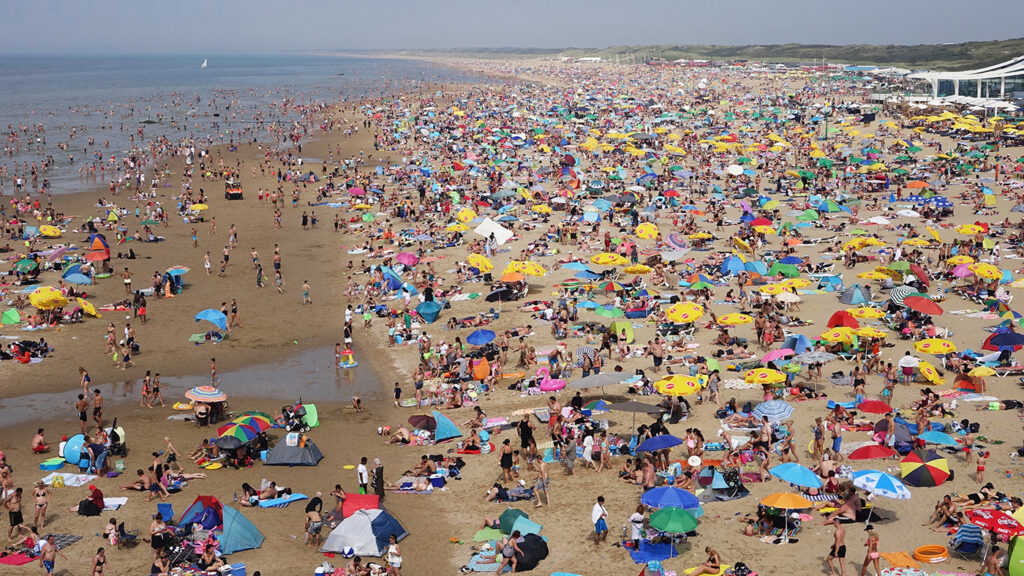Organised by the Royal Swedish Academy of Sciences. Video from the webinar can now be watched.
The world’s population has a documented huge impact on the natural environment, to the extent that human development is said to have given rise to a new geological era, the Anthropocene, where people influence their environment at a geological scale. Simultaneously, human population has exploded during the 20th century to its current level of 7.9 billion. On average, the human population is healthier, lives longer, and with a higher standard of living than in earlier centuries. This development has relied partly on the use of abundant natural resources and ecosystem services. However, recent environmental degradation, including climate change, indicates that ecosystems are reaching critical thresholds and may not be able to provide the same level of support via goods and services as in the past.
The Royal Swedish Academy of Sciences is arranging a symposium around the theme “Population and Environmental Change”, to take place on September 23 and 24, 2021. Five invited speakers from different disciplines will present the latest advances on the interactions between human populations and the environment. The symposium will end with a panel discussion, where the panellists comment on and discuss the formal presentations.
Invited speakers:
- Professor Lori Hunter, University of Colorado, USA.
- Professor Leiwen Jiang, Asian Demographic Research Institute (ADRI), Shanghai University, China and Population Council, USA.
- Professor Eric Lambin, Stanford University, USA and University of Louvain, Belgium.
- Professor Wolfgang Lutz, Wittgenstein Centre for Demography and Global Human Capital (IIASA, OeAW, University of Vienna), Austria.
- Professor Karen Seto, Yale University, USA.
Panellists:
- Professor Gustaf Arrhenius, The Institute for Futures Studies, Sweden
- Dr. Wendy Broadgate, Future Earth, Sweden.
- Professor Line Gordon, Stockholm Resilience Centre, Stockholm University, Sweden.
- Professor Thomas Sterner, University of Gothenburg, Sweden
Programme
Thursday 23 September
Moderator: Agneta Sundin, The Beijer Institute of Ecological Economics, Sweden.
15:00
Welcome remarks
Göran K. Hansson, Secretary General, The Royal Swedish Academy of Science, Sweden.
Anne-Sophie Crépin, Deputy Director, The Beijer Institute of Ecological Economics, Sweden.
15:15
Population dynamics, carbon emissions, and climate change
Professor Leiwen Jiang, Asian Demographic Research Institute (ADRI), Shanghai University, China and Population Council, USA.
16:00
Break
16:10
From Food Systems to Climate Change: How Urbanization is Reshaping Humanity’s Imprint on the Planet
Professor Karen Seto, Yale University, USA.
16:55
Break
17:05
Population and land use: from coupled to telecoupled systems
Professor Eric Lambin, Stanford University, USA and University of Louvain, Belgium.
17:50
Closing remarks
Friday 24 September
Moderator: Agneta Sundin, The Beijer Institute of Ecological Economics, Sweden.
15:00
Welcome remarks
15:05
Climate change and migration
Professor Lori Hunter, University of Colorado, USA.
15:50
Break
16:00
Population and human capital scenarios for the 21st century in the context of environmental change
Professor Wolfgang Lutz, Wittgenstein Centre for Demography and Global Human Capital (IIASA, OeAW, University of Vienna), Austria.
16:45
Break
16:55
Panel discussion
Professor Gustaf Arrhenius, The Institute for Futures Studies, Sweden, Dr. Wendy Broadgate, Future Earth, Sweden, Professor Line Gordon, Stockholm Resilience Centre, Stockholm University, Sweden, Professor Thomas Sterner, University of Gothenburg, Sweden.
17:40
Closing remarks
The Royal Swedish Academy of Sciences occasionally record and photograph during its events. Photographs and video footage will be processed by the Academy and submitted to third parties for processing. Photographs and videos may also be used in our communication activities to provide information about the Academy’s activities in any of the digital and/or printed channels used by the Academy. If you do not consent to this or have other questions about our processing of personal data, please call us on +46 8 673 95 00, or email kva@kva.se
Read more about how the Academy processes your personal data
Contact
Peter Brandén
Program Coordinator
program@kva.se
